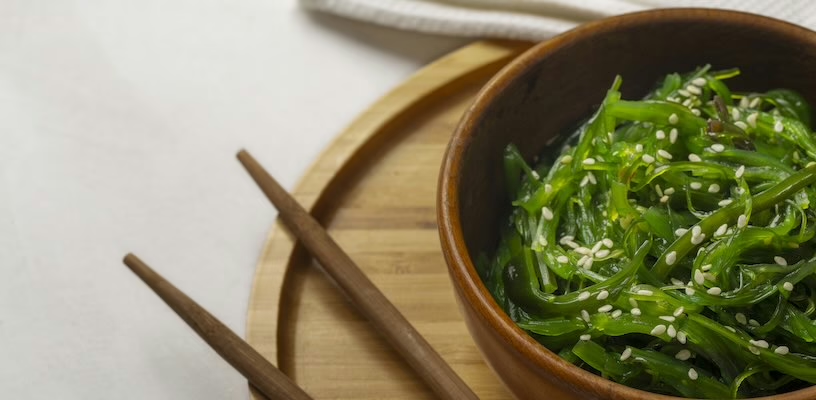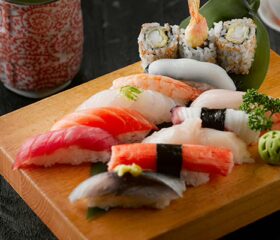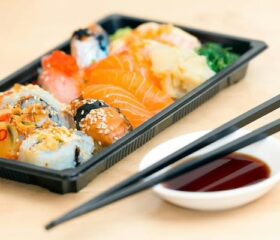Can Pregnant Women Eat Seaweed? Risks and Safety Tips
Pregnancy brings many dietary questions. If you're a fan of seaweed, you might be wondering if it's safe to continue enjoying this ocean vegetable.

Seaweed is often celebrated as a superfood—meaning it’s supposedly packed with a lot of beneficial nutrients. But is it safe to eat it during pregnancy, and if so, how much is too much?
Let’s explore the facts about seaweed consumption during pregnancy, including its benefits, potential risks, and how to incorporate it safely into your diet.
Is seaweed safe to eat during pregnancy?
The quick answer is that yes, you can eat seaweed during pregnancy, but it depends on what kind.
Seaweed, also known as marine algae, encompasses a variety of edible plants found in the ocean. It’s a staple in many cuisines worldwide and has a rich nutritional profile.
Edible seaweed comes in three main varieties: 1
- Red seaweed: This refers to dulse, carrageen, and nori or “purple laver” (used in sushi rolls).
- Brown seaweed: This includes kelp (e.g., kombu, wakame, arame) and fucus (e.g., hijiki). You’ll often find brown seaweed in soups, salads, and stews.
- Green seaweed: This group encompasses sea grapes, sea lettuce, and chlorella. Green seaweed is frequently found in salads and soups.
Red and green seaweed are perfectly safe, but you should exercise caution with brown varieties. While they may not be as infamous as other well-known foods to avoid during your pregnancy, they have high iodine content that could make you feel sick if you eat too much. Some kinds, like fucus (e.g., hijiki), are also known for their high levels of heavy metals, like arsenic. 2 3
It’s best to stay away from brown seaweed while you’re pregnant. If you’re determined to have it, don’t eat more than one serving per week when you’re pregnant or breastfeeding. 4
What are the potential risks of eating seaweed during pregnancy?
While seaweed offers many health benefits, you need to eat it in moderation and buy from reputable brands to lower your exposure to:
Iodine
Some seaweed is naturally high in iodine. This nutrient is essential for thyroid function, but having too much seaweed may cause you to exceed your recommended intake during pregnancy—about 220–250 micrograms (mcg) a day, with a hard limit of 1,100 mcg. 1 5 6
Excessive iodine intake can lead to thyroid problems such as hyperthyroidism (for you and your baby) or cause your baby’s thyroid gland to grow too large, which is called goiter. Some types of goiter can cause your baby to have problems breathing or swallowing when he’s born. 7
Consuming iodine excessively can also lead to iodine toxicity, with symptoms ranging from mild to severe: 6
- Stomach upset
- Nausea
- Vomiting
- Diarrhea
- Disorientation and confusion
- Lethargy
- Shock
Again, this doesn’t mean you have to skip all seaweed. Just be careful with it, especially brown varieties.
Consider recording how much you eat in your journal or a pregnancy tracker app so you don’t exceed your intake limit.
Heavy metals
Seaweed can absorb heavy metals like arsenic, cadmium, lead, and mercury from seawater, especially when it’s contaminated by industrial or sewage runoff. 1
All these metals are listed on California’s Proposition 65 list of foods that contain chemicals known to cause cancer, birth defects, or other harm to your reproductive health. 8
If you consume seaweed in moderation, you aren’t likely to ingest heavy metals in dangerous amounts. However, don’t take seaweed supplements. The concentrated seaweed in these may contain higher levels of these metals, and the Food and Drug Administration (FDA) doesn’t review dietary supplements for safety and effectiveness. 1 9
Your doctor will decide if you need to take any supplements during your pregnancy and help you choose one. Never start taking anything without running it by them first.
Potential allergens
Some people are allergic to seaweed. If you’re new to it, introduce it into your diet gradually and watch out for symptoms of an allergic reaction, such as: 10
- Hives
- Hoarse voice
- Swelling of your eyelids, face, lips, and tongue
- Trouble swallowing or breathing due to a swollen throat
- Itchy mouth, throat, eyes, skin, or other areas
- Dizziness, lightheadedness, fainting, or a feeling of impending doom
- Nasal congestion and runny nose
As mentioned, you may have gastrointestinal issues after eating too much seaweed, such as an upset stomach, nausea, vomiting, and diarrhea. 6
What are the nutritional benefits of seaweed?
If the potential issues above alarmed you, don’t worry—it’s not all bad. As mentioned, seaweed contains iodine, which helps with thyroid function and also plays a role in your baby’s brain development. 11
Seaweed is also a great source of other nutrients that can be particularly beneficial during pregnancy, such as: 1 11 12
- Fiber: If you’re struggling with constipation during your pregnancy, fiber can help alleviate it. 13
- Iron: Your body needs this nutrient to help deliver oxygen to your body via your red blood cells.
- Vitamin A: This promotes healthy skin, eyesight, and bone growth for your baby.
- Vitamin B9: The natural form of this is folate (called folic acid in supplements). It supports the growth of the placenta and helps prevent birth defects of your baby’s brain and spine.
- Vitamin C: Your baby needs this vitamin to develop healthy gums, teeth, and bones.
- Omega-3 fatty acids: These healthy fats are also important for your baby’s brain development.
- Antioxidants: Antioxidants can protect against cell damage and combat oxidative stress, which may be elevated during pregnancy. 14
- Magnesium: This mineral (along with calcium) helps you maintain a healthy blood pressure and may prevent the leg cramps that are common in the latter half of pregnancy. 15
Don't rely on seaweed as a source of B12
Many people eat seaweed to get B12, which helps prevent anemia. 16 However, the B12 in seaweed (and, for that matter, other foods like miso, tempeh, tamari, sauerkraut, and spirulina) is an inactive form of this nutrient that your body can’t use. It’s better to talk to your doctor if you think you have a deficiency. 17
How to safely eat seaweed during pregnancy
Seaweed is naturally low in calories, which can make it a healthy pregnancy snack to satisfy your cravings. 1
However, to reiterate, don’t eat more than a single serving of brown seaweed a week. 4 Green and red seaweeds have lower iodine levels, and you can consume those more frequently, but still in moderation.
When purchasing seaweed products, carefully check the labels for iodine content, sodium levels, and any added ingredients or preservatives that may not be suitable during pregnancy. 5 6
How to choose the best seaweed while pregnant
This probably goes without saying, but you can’t harvest seaweed on the beach. Those are probably the inedible kind; the ones that are harvested for consumption usually come from deeper, colder waters. 18
You’ll probably be able to find edible seaweed in the grocery store (often in the Asian or “Ethnic” aisles). You can also get it online or in stores with a focus on health foods or organic products.
Before you grab a bag, consider:
- Sourcing: Look at the packaging to see if the brand mentions where the seaweed came from or how it was harvested (they should have it listed). Research the company to see if they mention testing for contaminants (especially heavy metals like arsenic, lead, cadmium, and mercury). Check for third-party testing, which you can usually find in product FAQs or transparency reports.
- Certifications: Does the company mention having any certificates (e.g., USDA Organic, EU Organic, Non-GMO, third-party lab-tested)? Look on their website for COAs (Certificates of Analysis), which confirm that their products meet quality and regulatory requirements.
- Reviews: Search for customer reviews and industry ratings on sites like Amazon, Reddit, ConsumerLab, etc.
How to safely prepare seaweed at home
Seaweed can be a versatile and nutritious addition to your pregnancy diet when consumed safely.
There are seaweed chips and sheets that you can eat straight out of the packaging or wrap sushi rolls with, but if you plan to cook your seaweed, you should rinse it, then soak it for a few minutes to get rid of excess salt, microplastics, and other contaminants, like heavy metals. 19
Soaking it also rehydrates the seaweed, after which you can: 11 18
- Use it to flavor broths, soups, noodle dishes, and casseroles
- Create a quick seaweed salad with sesame oil and vegetables
- Sprinkle it in with your granola, plant-based Caesar dressing, or salads
- Sauté it with garlic, carrots, and onions
- Add it to stir-fried dishes
Before making any significant dietary changes during pregnancy, consult with your doctor or a registered dietitian. They can provide personalized recommendations based on your needs and health status.
Final thoughts
Seaweed can be a valuable and nutritional addition to your pregnancy diet as long as you’re smart about how often you eat it and how you prepare it. Always prioritize consulting with your doctor to ensure you make the best and safest choices for you and your baby.
Article Sources
- The Nutrition Source. "Seaweed" Retrieved September 22, 2025.
- MedlinePlus. "Herbs and Supplements" Retrieved September 22, 2025.
- Proposition 65. "Foods and Beverages" Retrieved September 22, 2025.
- Food Standards Australia New Zealand. "Pregnancy and healthy eating" Retrieved September 22, 2025.
- The Nutrition Source. "Iodine" Retrieved September 22, 2025.
- StatPearls. "Iodine Toxicity" Retrieved September 22, 2025.
- MotherToBaby. "Iodine" Retrieved September 22, 2025.
- Proposition 65. "Frequently Asked Questions" Retrieved September 22, 2025.
- U.S. Food and Drug Administration. "Information for Consumers on Using Dietary Supplements" Retrieved September 22, 2025.
- MedlinePlus. "Food allergy" Retrieved September 22, 2025.
- American College of Obstetricians and Gynecologists. "Nutrition During Pregnancy" Retrieved September 22, 2025.
- Harvard Health Publishing. "Seaweed: A tasty, nutritious snack" Retrieved September 22, 2025.
- University of Rochester Medical Center. "Pregnancy: How Your Digestion Changes" Retrieved September 22, 2025.
- Healthline. "7 Surprising Health Benefits of Eating Seaweed" Retrieved September 22, 2025.
- Whole Health Library. "Supplements Used in Prevention of Preeclampsia and for Labor Preparation" Retrieved September 22, 2025.
- Children's Hospital of Philadelphia. "Anemia in Pregnancy" Retrieved September 22, 2025.
- Iowa Department of Health and Human Services. "Basic Nutrition Module" Retrieved September 22, 2025.
- Institute of Culinary Education. "How to Use Seaweed in Your Cooking (Not Just for Sushi)" Retrieved September 22, 2025.
- Connecticut Sea Grant. "Report of the Expert Meeting on Food Safety for Seaweed" Retrieved September 22, 2025.







